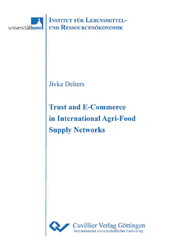| Departments | |
|---|---|
| Book Series (97) |
1381
|
| Nachhaltigkeit |
3
|
| Gesundheitswesen |
1
|
| Humanities |
2369
|
| Medienwissenschaften | 16 |
| Theology | 57 |
| Philosophy | 102 |
| Law | 423 |
| Economics | 851 |
| Social sciences | 417 |
| Sports science | 48 |
| Psychology | 233 |
| Educational science | 190 |
| History | 183 |
| Art | 111 |
| Cultural studies | 166 |
| Literary studies | 117 |
| Linguistics | 88 |
| Natural Sciences |
5408
|
| Engineering |
1795
|
| Common |
98
|
|
Leitlinien Unfallchirurgie
5. Auflage bestellen |
|
Advanced Search
Trust and Ecommerce in International Agri-Food Supply Networks (English shop)
Jivka Deiters (Author)Preview
Table of Contents, Datei (67 KB)
Extract, Datei (130 KB)
E-commerce offers opportunities for better competition by developing new products and markets, by bringing new actors onto the traditional markets and by developing new types of relationships between the traders. Additionally, using e-commerce, costs can be reduced and the satisfaction of the traders concerning faster delivery can be increased. Nevertheless, electronic transactions are not common in the agri-food sector compared with other businesses.
Every B2B relationship and also e-commerce starts with a first transaction. The initial transaction only takes place when the buyer’s perceived trustworthiness of the supplier exceeds the buyer’s perceived risks of the transaction. However, the challenge of the first transaction in e-commerce is how to communicate trust without any previous experience. Trust helps enterprises to trade across border and profit from the online environment, especially in the agri-food sector which deals with complex products due to different uncertainties and risks regarding the food quality and safety.
The main objective of this thesis is to analyse which elements of trust are essential in searching for a new international supplier and how these can be applied to e-commerce. To achieve this objective a stepwise approach has been developed by establishing the following phases: 1) identification of the most relevant trade flows; 2) exploration of trade relationships along the most relevant trade flows; 3) assessment of significance of traditional trust elements; 4) applications of traditional trust elements to e-commerce. The applications are determined by examining selected European (Germany, Austria, Italy, Greece, Spain and Slovenia) and cross-border (USA, Brazil and Turkey) agri-food chains (cereals, meat, fruits and vegetables, and olive oil) to contribute findings of possibly different cultural backgrounds. The identification of the most relevant trade flows (step one) is based on the statistical database and has been used as a basis for future research and to find out where the highest potential for the introduction of e-commerce in the international trade exists. The trade structures differed in the selected countries, and there is a complex picture. The second step has uncovered a predominance of long-term orientation of the international transactions’ exchanges. The findings from the obtained results suggest that the request of the agri-food enterprises for more personal relations explains their need for trusted transactions. The key players in the agri-food sectors have been asked (step three) to determine the priority of trust-building elements which have been developed in the preceding work by using the AHP which appertains to the decision support system. Based on the determination that cultural background can have a significant influence on the formation of trust, the results from the selected countries have been compared. An obvious difference between northern and southern countries has been identified. The northern traders are classified as being focused on provable facts and control with respect to the “product” while the southern ones are more oriented to the relationship with the “seller”. The last step has brought about results on what can be done to increase trustworthiness via B2B applications: like quality management certificates, specifications and warranties or a tracking & tracing system; these seem to be much better suitable than product pictures or market information. Proposals and first indications for trustworthines in B2B e-commerce as described in this thesis can be helpful within the traditional way of food transactions as a facilitator for food traders by accelerating the identification of new suitable suppliers.
| ISBN-13 (Printausgabe) | 3869554169 |
| ISBN-13 (Hard Copy) | 9783869554167 |
| ISBN-13 (eBook) | 9783736934160 |
| Final Book Format | A5 |
| Language | English |
| Page Number | 234 |
| Lamination of Cover | glossy |
| Edition | 1 Aufl. |
| Volume | 0 |
| Publication Place | Göttingen |
| Place of Dissertation | Universität Bonn |
| Publication Date | 2010-08-02 |
| General Categorization | Dissertation |
| Departments |
Economics
Domestic and nutritional science Agricultural science |
| Keywords | trust, factors of trust, dimensions of trust, e-commerce, electronic trade platforms, agri-food supply network, agri-food markets, supply chain management, analytic hierarchy process |








